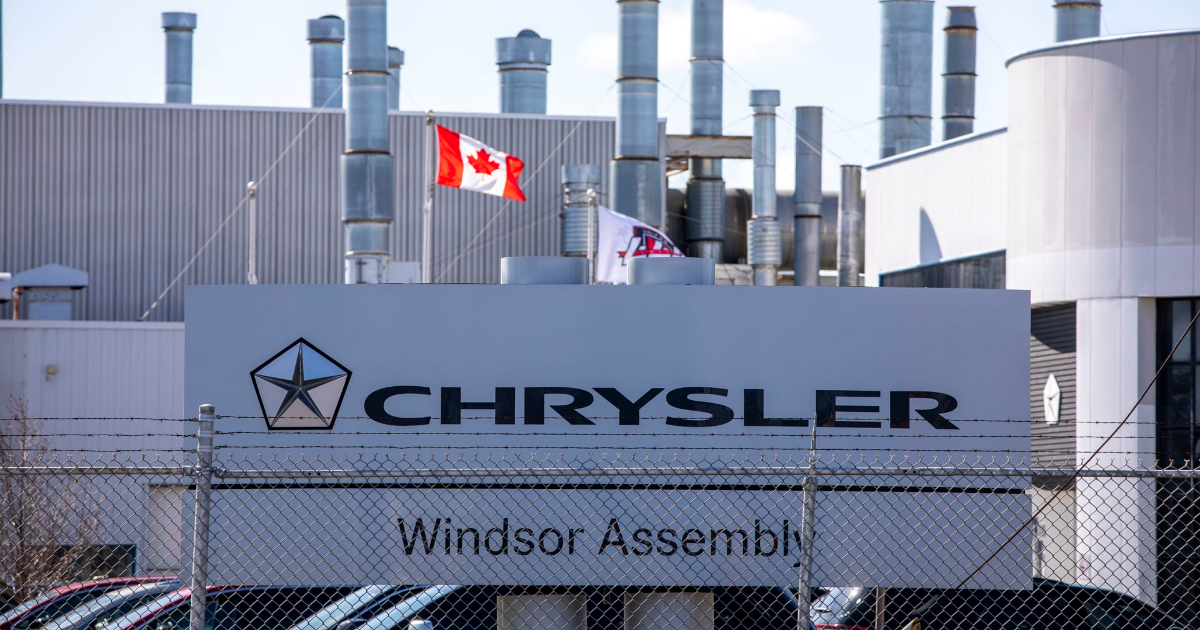The Stellantis Windsor Assembly Plant is shown on April 1, 2025 in Windsor, Canada.
DETROIT — Stellantis is pausing production at two assembly plants in Canada and Mexico as the company attempts to navigate President Donald Trump‘s new round of 25% automotive tariffs, the company confirmed Thursday.
The actions are the swiftest and most drastic by an automaker regarding the new tariffs, which took effect Thursday and are imposed on all vehicles imported to the U.S., including from Canada and Mexico.
Stellantis’ downtime starts Monday and is set for two weeks at the automaker’s Windsor Assembly Plant in Ontario, Canada, and the entire month of April at its Toluca Assembly Plant in Mexico.
As a result of the pause in production, about 900 workers in the U.S. at supporting plants will be temporarily laid off, in addition to about 4,500 hourly workers at the Canadian plant, according to a company spokeswoman. Workers at the plant in Mexico will still report to the facility but not produce vehicles due to their contract terms, the spokeswoman said
In an email to employees Thursday, Stellantis North American chief Antonio Filosa said the plant downtime is tied to the tariffs, as the company reviews its options.
“We are continuing to assess the medium- and long-term effects of these tariffs on our operations, but also have decided to take some immediate actions, including temporarily pausing production at some of our Canadian and Mexican assembly plants,” Filosa said. “Those actions will impact some employees at several of our U.S. powertrain and stamping facilities that support those operations.”
Shares of Stellantis closed Thursday at $10.21, down 9.4%. It’s the stock’s worst day since September.
The Canadian plant produces the Chrysler Pacifica minivan and the recently released Dodge Charger Daytona EV. The Mexico plant produces the Jeep Compass SUV and Jeep Wagoneer S EV.
Unifor National President Lana Payne, whose union represents the Canadian workers, on Thursday condemned the tariffs and voiced concerns for her members.
“Unifor warned that U.S. tariffs would hurt auto workers almost immediately and in this case the layoffs were announced before the auto tariff even came into effect,” she said in a release. “Trump is about to learn how interconnected the North American production system is the hard way, with auto workers paying the price for that lesson.”
Filosa said the “current environment creates uncertainty,” but assured employees that the company, which continues to search for a new CEO, is “very engaged with all of our key stakeholders, including top government leaders, unions, suppliers and dealers in the U.S., Canada, and Mexico.”
Halting production also will help Stellantis lower vehicle inventory levels that have built up amid lackluster sales for many of its brands.
Stellantis’ Detroit rivals Ford Motor and General Motors also responded to the tariffs, but not by idling production.
GM plans to temporarily increase pickup truck production at a plant in Indiana.
The increase in workers is in addition to those who the company was already hiring for the plant as supplemental workers to support summer breaks and time off for their regular employees, according to a person familiar with the plans.
GM, in an emailed statement, confirmed the plans Thursday without mentioning tariffs.
The Detroit automaker produces its crucial, highly profitable pickup trucks such as the Chevrolet Silverado and GMC Sierra at various plants in the U.S., Canada and Mexico.
GM has not cut production at any plants as a result of the tariffs like Stellantis is doing, said the person, who was not authorized to speak to media.
Hours after Trump’s tariffs went into effect, Ford announced it will offer its employee discount to all customers.
Ford said the sales program — running from April 3 through June 2 — includes “significant savings” but did not release exact details on the discounts.
The program, which it’s calling “From America, For America,” excludes some larger vehicles like the Ford Raptor, 2025 Ford Expedition, Ford Super Duty trucks and Lincoln Navigator SUVs.
“We understand that these are uncertain times for many Americans,” the company said in a statement. “We have the retail inventory to do this and a lot of choice for customers that need a vehicle.”
U.S. auto sales in the first quarter came in higher than expected as consumers flocked to buy cars ahead of auto tariffs taking effect, which many expect will lead to higher vehicle prices.
— CNBC’s Michele Luhn contributed to this article.
